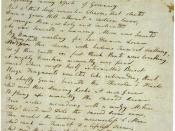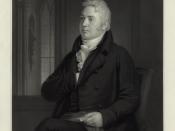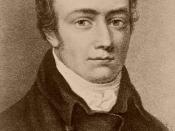Samuel Taylor Coleridge was one of the original poets and thinkers of the Romantic movement in the late 18th and early 19th centuries. Though Coleridge co-authored The Lyrical Ballads with William Wordsworth, a foundational collection of poems that helped to define Romanticism, Coleridge was unique in his poetic style. While Wordsworth set forth the importance of writing with "a selection of language really used by men" (Leitch 650), Coleridge enjoyed the musical effects of language in their own right. Furthermore, his unique portrayal of the mind and its movement helped to define the emotional intimacy of the Romantics (Phillips). "The Eolian Harp" was Coleridge's first major achievement in the Romantic genre of sustained blank verse. The poem is a reflective monologue, and its content is both descriptive and meditative (Abrams). Coleridge explores the extent to which a poet should strive for and desire individuality. As revealed in "The Eolian Harp," spending time examining individuality and creativity is a vain and futile pursuit.
A New Critical approach to the poem illuminates Coleridge's artistry in conveying this message.
New Criticism developed among American literary critics during the 1930s and 1940s. Writers and professors like Robert Penn Warren and Cleanth Brooks reacted against trends then current in literary study, such as the preoccupation with biographies and history (Hedges).
John Crowe Ransom, a professor of English at Vanderbilt University, is the most credited for outlining and defining the New Critical approach to literature in his 1941 book The New Criticism. According to Ransom, "Criticism is the attempt to define and enjoy the aesthetic or characteristic values of literature" (qtd. in Leitch 1110). While this definition may sound broad, Formalists attempt to narrow the range of material with which a critic need work. They regard a piece of literature as standing...


